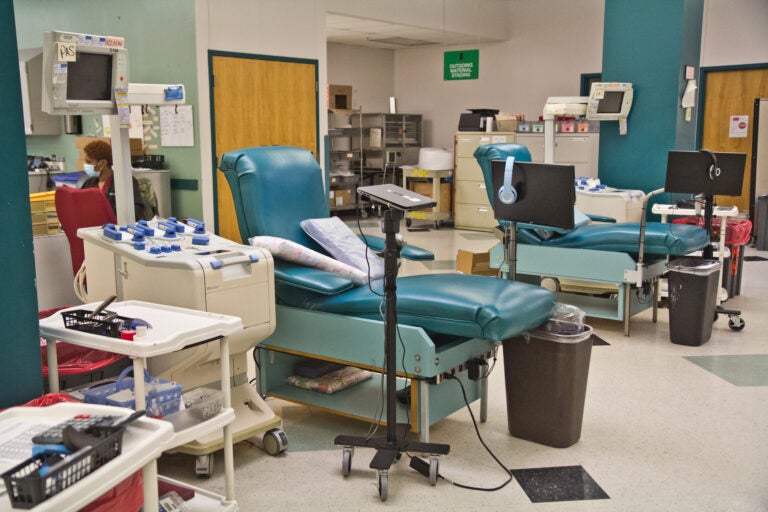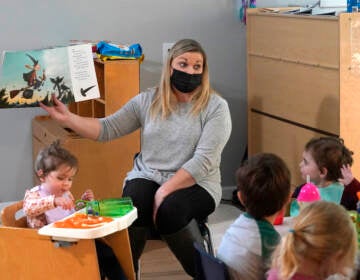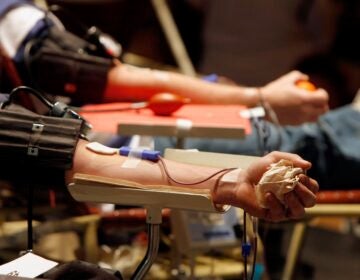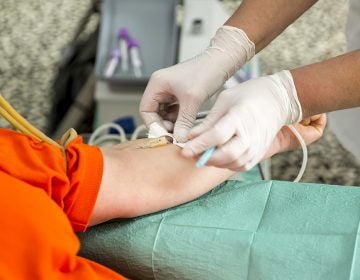Hospitals in Philly are facing a serious blood shortage. How it’s affecting patients and how you can help
Faced with the worst blood shortage in a decade, blood banks in the Philadelphia region are urging people to donate and to encourage others to do the same.

The Red Cross Blood Donation Center on Spring Garden Street in Philadelphia. (Kimberly Paynter/WHYY)
A decrease in donors and an increase in traumas and surgeries have contributed to the worst blood shortage in more than a decade in the Philadelphia region and across the nation.
Alana Mauger, regional communications manager of the American Red Cross, said it is typical to have fewer donors during the summer months, but it was worse than usual this year.
“As COVID cases began to spike in August, we saw about a 10% decrease in the number of blood donors that are coming out to give blood,” she said. “And at the same time, the demand for blood from hospitals has remained higher than normal.”
So the supply was lower than usual, and the need for blood was greater than usual.
“People, unfortunately, would still have a bleed that would put them in the hospital,” said Dr. Meenakshi Bewtra, assistant professor of medicine and epidemiology at the University of Pennsylvania, and a Penn Medicine physician. “They would unfortunately still get into accidents that would require a blood transfusion. And very unfortunately, they would still get cancer that would require a blood transfusion. And so you have a new disease that requires transfusions on top of everything else and a real decrease in supply.”
Experts expected blood donations to increase during the fall as people returned to their “normal” routines with the lifting of the most strict COVID-19 restrictions and the rollout of vaccines. But organizations like the American Red Cross are seeing a 10% decrease in donors.
Mauger said some of this may be because of continued coronavirus safety protocols, as schools and businesses may be unwilling to open their doors to hold a blood drive, or the continued fear some people have of going to public places.
“Typically, what the Red Cross likes to have is a five day blood supply of all blood types on the shelves at hospitals or at least in our blood bank, ready to take to hospitals if they’re needed,” said Mauger. “So a five day supply is considered adequate. What we’re seeing right now is that some blood types, especially type O, have less than a half day supply.”
Blood shortage leads to rationing, tough decisions
The low supply is affecting hospitals in the area, and how they operate.
“We have a triage policy now,” Bewtra said. “Hospital blood banks will say in bold letters, ‘We have seen a reduction in all blood types, all available blood units, but we’re critically low for type B and type O.’ And then there’s a policy for if you’re not in the operating room. This is how many units you’re going to get. Then, you’re going to have to contact us to justify use if it’s in an operating room.”
For many people in trauma situations, whether a car accident or an emergency surgery, this could be very serious. Bewtra said it adds additional pressure on doctors as well. If there is a patient rapidly losing a lot of blood, she said blood banks will support physicians in their decision making, but there is still the requirement to step out of the room and make a phone call to justify their decision, which instead could be time spent helping the patient.
Philadelphia’s historic gun violence epidemic has added more strain. As of Monday, at least 1,817 people have been shot in Philadelphia so far in 2021. Bewtra said she has heard from her surgeon colleagues at the hospital that it takes less blood to help someone who has been injured in a car accident than in a shooting, leading to some difficult decisions.
“The blood is much more lost and their life is at stake, so we are simultaneously trying to save their life while just getting them blood products. If you have a limit of available blood products, if you have to stop that protocol and recheck and wait to recheck and call the blood bank and say, ‘can I get another unit or another two units,’ that’s an uncomfortable position for everybody in that operating room, and there are things that are preventable.”
The decrease in blood donations has also come with a decrease in platelet donations, which is critical for patients with cancer. While blood typically has a shelf life of 42 days, platelets only last five days, forcing doctors to ration them.
Mauger said typically, cancer patients receive two units of platelets, but due to the blood shortage, some hospitals have to give each patient only half a unit, so each one has at least some of the necessary platelets.
How you can donate
Public health officials and blood banks are urging people to donate if they are able.
If you cannot donate blood, educating others about the blood shortage is just as helpful, Mauger said.
“The Red Cross found that the number one reason people don’t give blood is not fear of needles. The number two reason is actually because they were never asked and/or never thought about it,” she said. “So having that conversation with people is a really important place to start.”
She suggests you can also sponsor a blood drive for your community or business.
Visit the Red Cross website for more information about how and where to give blood in the region.

Get daily updates from WHYY News!
WHYY is your source for fact-based, in-depth journalism and information. As a nonprofit organization, we rely on financial support from readers like you. Please give today.





